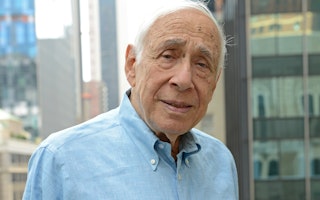Creating Sustainable Farms, One Abandoned Prison at a Time
By Donysha Smith

Impoverished regions of the rural American South are home to some of the highest unemployment and violent crime rates in the nation. In North Carolina, Soros Justice Fellow Noran Sanford is working to change that with his innovative Flip the Prison initiative, which empowers youth to free themselves from the grip of the criminal justice system by repurposing the relics it left behind. He spoke to us about his project.
Flipping prisons into sustainable farms is a nontraditional way to address youth incarceration. How does turning a jail cell into an aquaponics tank keep at-risk youth out of the system?
As one of the poorest rural regions of the U.S. Southeast, we have a number of youth in the correctional system that by a very young age are already headed to adult prison. We empower them and give them the tools to reverse the course that leads to gangs, incarceration, and/or death. Sustainable agriculture, agtourism, and recreational revisioning of an old prison liberate young people from gangs and other gateways to the criminal justice system.
At GrowingChange we partner with youth as community leaders to create jobs and educational opportunities by repurposing the prison itself, a rusting tool of injustice, into a force for growth and healing. This endeavor allows youth to transform guard towers into climbing walls, a prison bus into a traveling museum, the galley into a certified community kitchen, the old “hot box” (isolation chamber) into a recording studio, and yes, jail cells into aquaponics tanks.
These efforts, combined with the work we do with the youth on confidence, leadership, and personal agency are why we have a 92 percent success rate in keeping justice-involved youth from entering the adult prison system.
Tell us about the moment that moved you to advocacy.
Five years ago, I was working with a young person who had been kicked out of his home, kicked out of school, and put on probation at a young age. Our traditional approaches were failing this bright, savvy middle school student because they did not address the realities of his tough neighborhood.
That same year, I attended a funeral for another young man who was lost to gang violence. At that funeral, I made a pledge that we would grow the kind of change that could thrive in every neighborhood in our challenged area.
The school-to-prison pipeline is often viewed through an urban lens. What is the connection between rural disinvestment and youth incarceration?
North Carolina and New York are the last two states in the union where one is charged as an adult for all crimes at age 16. Now consider the complexities of growing real opportunity for change in our poor, rural areas that do not benefit from the focus, funding, and philanthropy of their urban neighbors.
Without public transit systems, recreational centers, or robust public libraries, areas that struggle with high unemployment and grim outcomes become hubs of generational poverty often fueled by policies that promote high incarceration rates. Prisons were sold to poor rural areas as economic development, but now closed prisons are falling into disuse and vandalism—over 25 in North Carolina alone.
GrowingChange provides mental health services in addition to entrepreneurial skills. You’ve worked for years as a mental health professional helping youth and their families in the juvenile justice system. What are we missing when it comes to justice-involved youth, and mental and other health outcomes?
It’s not enough to work with justice-involved youth alone. If you want to positively impact health outcomes, you have to work with the power systems that surround them as well: family, schools, courts, and state leaders. We must empower the systems in the same three ways we empower our youth: by giving them the tools to see our youth differently, the capacity to believe that these young people can transform, and then set up opportunities for families, schools, and courts to treat these youth differently.
Our clinical tools help the families support the positive steps the youth are taking. We then help the systems recognize the service our youth are giving back to the community. These power systems learn that our youth are now community leaders and powerful allies in growing the kind of change we need.
What do you hope to accomplish by the end of your project, and what do you see yourself doing in the next 10 years?
Through my Soros Justice Fellowship, I am launching our nonprofit startup, a capital campaign to continue our clinical pilot. We are helping to empower North Carolina leadership with a replicable model of what to do with closed prisons in poor, rural areas and beyond.
In 10 years, we want to be facilitating a federation of transformed sites as we give our model to the leaders of other communities who are committed to Flip the Prison. We believe that by transforming prisons we are reclaiming a complicated site of great suffering and flipping it into a site for rejuvenation for youth in the court system, returning veterans, and our surrounding community.
Until December 2018, Donysha Smith was a communications associate for U.S. Programs.

